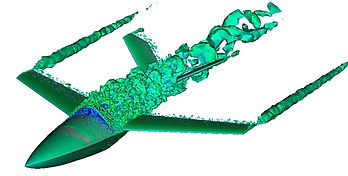
Numerical Framework for Aerospace Applications: from Subsonic to Hypersonic Non-Equilibrium
We developed the high-fidelity simulation framework for various aerospace applications ranging from subsonic to hypersonic non-equilibrium flow regimes. The applications include aerodynamics and rotor control for urban air mobility and eVTOL vehicles, buffeting of the tail and wings during transonic regime, understanding the effect of turbulence on aircraft performance during the transonic regimes, re-entry vehicles (including problems with ionization and ablation), and more. The framework is based on stabilized and variational multi-scale methods for fluid mechanics. The finite elements method (FEM) is used for discretization and special techniques (weak imposition of the Dirichlet boundary conditions and sliding interface formulation) is adopted to simulate complex flow behaviour.

Aerodynamic simulation (right) of the ducted propeller for small-scale UAVs (top)

Our group is currently working on extending the framework to the high-speed reacting flows, including the combustion modeling, and fluid-thermal-structure interaction (FTSI).


Aerodynamic simulation (top) of the make-up model of the Kratos XQ-58A Valkyrie UAS (bottom) at the subsonic flow regime.



Numerical simulation of the double cone at M=12.2, Re=1.5e+5, H=5.44 MJ/kg. Two simulations are performed, reacting equilibrium and reacting non-equilibrium. Results shown are: 2D slice of the Mach contour (left), surface pressure distribution (right-top), surface heat transfer distribution (right-bottom). Results are compared with experiment from LENS facility, LAURA and US3D codes.



Mach contours and wall pressure coefficient distribution for the VLC capsuleat angle of attack of 20degree, M=6, Re=1.24e+6: the full energy predictions (left), results predicted by LAURA code (centre), normal force coefficient (right).
Publications
-
M. R. Rajanna, M. Jaiswal, E. L. Johnson, N. Liu, A. Korobenko, Y. Bazilevs, J. Lua, N. Phan, M.-C. Hsu
Fluid–structure interaction modeling with non-matching interface discretizations for compressible flow problems: simulating aircraft tail buffeting, Computational Mechanics, 2023, under review -
D. Codoni, A. Bayram, M. Rajanna, C. Johansen, M.-C. Hsu, Y. Bazilevs, A. Korobenko
Heat flux prediction for hypersonic flows using stabilized formulation, Computational Mechanics, 2023, accepted -
B. Dalman, A. Korobenko, P. Ziade, A. Ramirez-Serrano, C. Johansen
Validation and verification of a conceptual design tool for evaluating small-scale, supersonic, unmanned aerial vehicles, 2023, under preparation -
M. R. Rajanna, E. L. Johnson, F. Xu, N. Liu, J. Lua, N. Phan, Y. Bazilevs, A. Korobenko, M.-C. Hsu
Fluid–structure interaction modeling with non-matching interface discretizations for compressible flow problems: application to aircraft simulations, Mathematical Models and Methods in Applied Sciences, 32(12), 2497-2528, 2022 -
D. Codoni, C. Johansen, A. Korobenko
A Streamline-Upwind Petrov-Galerkin stabilized method for the analysis of nonionized reacting hypersonic flows in thermal nonequilibrium, Computer Methods in Applied Mechanics and Engineering, 398, 115185, 2022 -
M. Rajanna, E. L. Johnson, D. Codoni, A. Korobenko, Y. Bazilevs, N. Liu, J. Lua, N. Phan, M.-C. Hsu
Finite element methodology for aircraft aerodynamics: development, simulation, and validation, Computational Mechanics, 70(3), 549-563, 2022 -
G. Doerksen, P. Ziade, A. Korobenko, C. Johansen
A numerical investigation of recirculation in axisymmetric confined jets, Chemical Engineering Science, 254, 117603, 2022 -
D. Codoni, G. Moutsanidis, M.-C. Hsu, Y. Bazilevs, C.T. Johansen, A. Korobenko
Stabilized finite element formulation for high-speed compressible flows: towards hypersonic simulations, Computational Mechanics, 67(3), 785-809, 2021 -
H. H. Stoldt, C. T. Johansen, A. Korobenko, P. Ziadé
Verification and Validation of a High-Fidelity Open-Source Simulation Tool for Supersonic Aircraft Aerodynamic Analysis, Journal of Verification, Validation and Uncertainty Quantification,6(4), 041005 (11 pages), 2021
